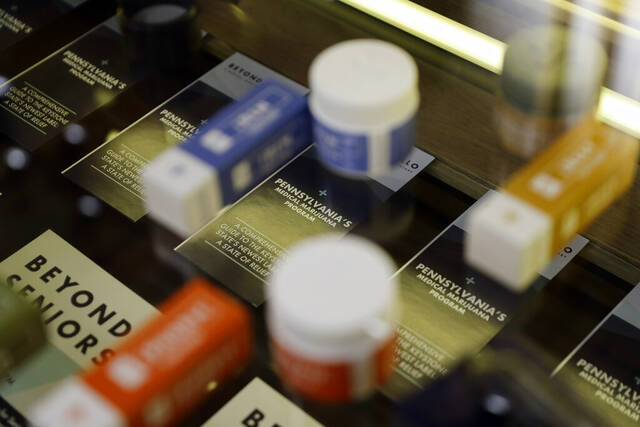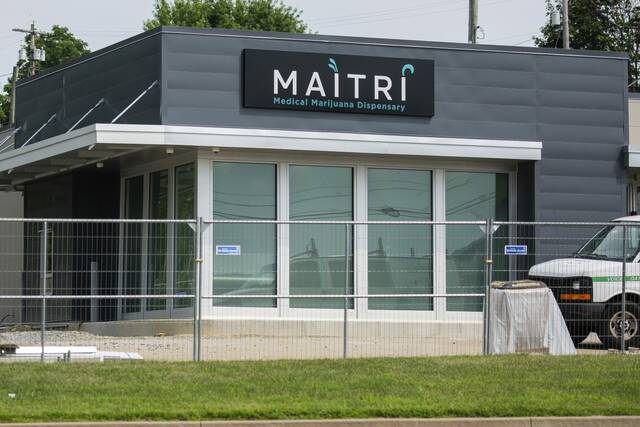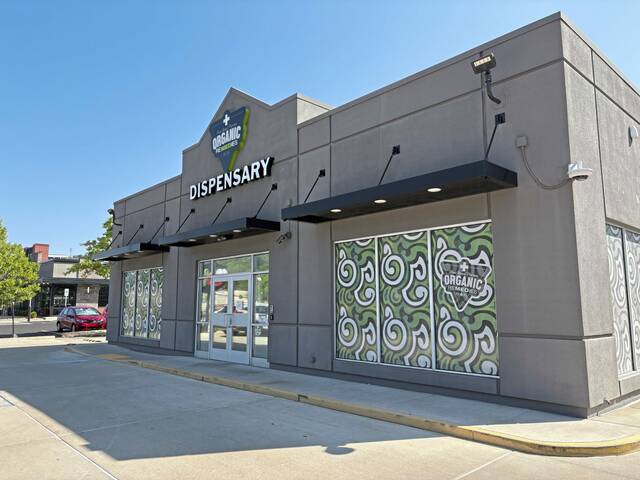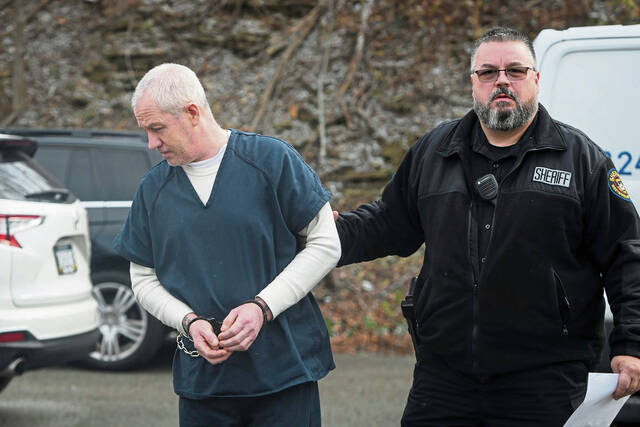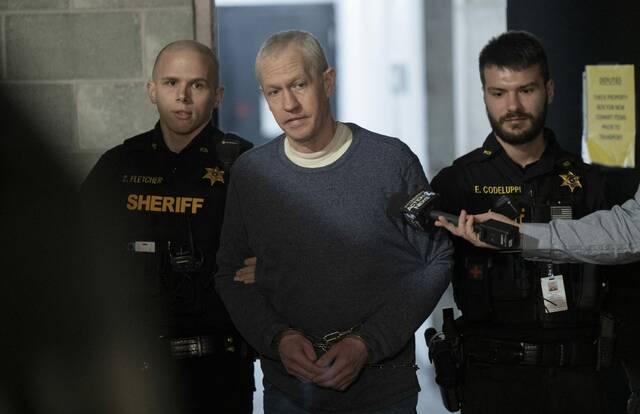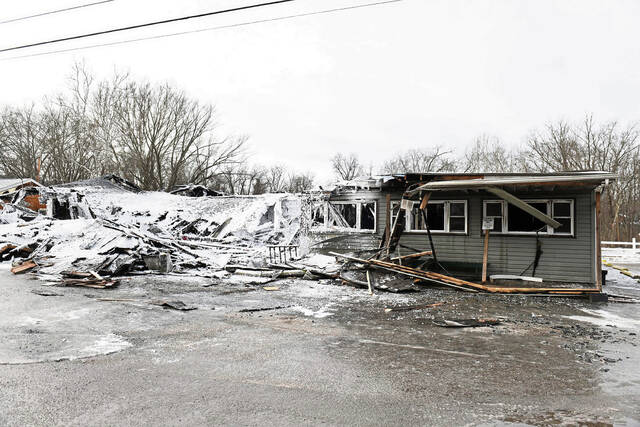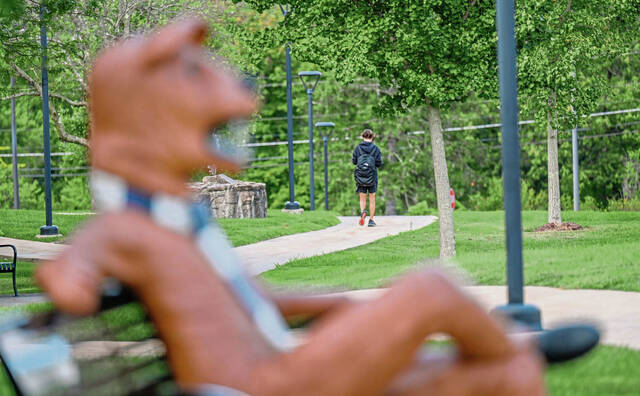As the medical marijuana industry in Pennsylvania continues to grow, one entrepreneur says the state is missing out on a major revenue boost by not legalizing recreational use.
Ari Raptis, founder and CEO of Talaria Transportation LLC and National Secure Transport, anticipates his businesses in Pennsylvania would grow fivefold if state lawmakers were to legalize recreational marijuana.
He has seen the growth of the industry in other states that have transitioned from medical to recreational use.
While the debate over the legalization of recreational marijuana in Pennsylvania continues in Harrisburg, legislators also are navigating what legalization could look like and how it was handled in surrounding states.
Raptis’ companies operate in more than 30 states and are involved in transporting marijuana from cultivation centers to dispensaries and in moving money from dispensaries to banks.
Raptis said the state is “missing out on significant tax dollars” by not legalizing. The state could use that tax revenue to improve infrastructure and schools, he said.
He also noted the influx of jobs created through legalization.
Legislation in May to legalize marijuana and create state-owned stores, akin to the liquor store model, was passed by the House in a vote of 102-101, but struck down by the Senate law and justice committee just five days later.
“I have said repeatedly that a state-store model for adult-use cannabis will not pass the Senate,” said state Sen. Dan Laughlin, R-Erie, in a prepared statement.
He introduced bipartisan legislation in July that would legalize marijuana and provide for a permit-based store model. Under Senate Bill 120, medical dispensaries would have to pay a fee of $50,000 to $100,000 to register with the state as a recreational dispensary.
Additionally, the new bill would impose a sales tax of 6% and an excise tax of 8% on all cannabis products, compared to the state’s current 5% excise tax on medical marijuana.
Others oppose the bill.
“Senate Bill 120 would rob communities of their right to protect themselves and open the door to high-potency THC products, heavily marketed to children,” Kevin A. Sabet, president and CEO of Smart Approaches to Marijuana, said.
A new Cannabis Control Board would be created by the bill, which would replace the Department of Health and its Medical Marijuana Advisory Board as the main governing body over the industry.
A spokesman for the Department of Health declined to comment on the pending legislation.
Dispensary numbers growing
The number of medical marijuana dispensaries in Southwestern Pennsylvania has grown exponentially since the program was signed into law in 2016. In 2018 there were eight dispensaries in Butler, Allegheny, Westmoreland, Fayette and Washington counties combined.
Today, there are 35 in the same five-county region.
It is hard not to notice the often sleek, modern facades of the stores popping up around the area, many of which are operated by a handful of the same companies: Zen Leaf, Trulieve, Maitri Medicinals, Ethos and Sunnyside.
Some companies — such as Sunnyside, which is owned by Cresco Labs — operate nationally, while others — such as Maitri Medicinals — are owned locally.
A new Maitri dispensary is under construction in New Stanton. The company also operates dispensaries in Pittsburgh, Uniontown and Greensburg.
Representatives did not respond to a request for comment about the expansion.
Application process
Registration for a medical marijuana card in Pennsylvania requires a certification of one of 24 medical conditions determined by the state Department of Health, including cancer, chronic pain, post-traumatic stress disorder and anxiety.
Certifications are made by approved physicians who are registered with the state. The average cost of a certification consultation for program participants varies greatly depending on the doctor.
Some websites that connect patients with approved physicians offer a consultation for as little as $45, while others charge $200. Some claim to get patients certified in “as little as one day,” or even “in minutes.”
If approved, applicants must pay an annual $50 processing fee to the Department of Health for the card. Medicaid, SNAP, CHIP, WIC, and PACE recipients may qualify for a fee waiver.
Certification appointments do not have to be conducted in person or by a patient’s primary care provider, meaning there are doctors who dedicate their practices solely to medical marijuana certifications and patients who only speak with their certifying doctor for a few minutes a year.
A Spotlight PA investigation in December found that in 2022 alone, the top 10 Pa. medical marijuana card certifying physicians approved over 85,000 certifications collectively.
The top physician, Rebecca Maury, certified 14,680 medical marijuana patients that year.
Though the Department of Health does not have the power to regulate the websites that advertise marijuana card certifications, the spokesman in a statement to TribLive said the department and State Board of Medicine do investigate “complaints to hold practitioners accountable for noncompliance with certification protocols.”
There were 441,530 active medical marijuana certifications and 1,905 approved practitioners as of June 1, according to data shared during a June 25 meeting of the Medical Marijuana Advisory Board.
The number of certifications has remained relatively steady as of late, hovering at roughly 440,000 for the past year.
Adding anxiety to the mix
The program has been evolving since its implementation, seeing changes such as the inclusion of anxiety as a qualifying condition in 2019.
Research done by the University of Pittsburgh and Johns Hopkins University showed that medical marijuana applications nearly tripled each month in the four years to follow. Department of Health data acquired by Spotlight PA showed an increase from 1,249 certifications in 2017 to over 424,000 in mid 2022.
Anxiety overtook chronic pain as the number one qualifying condition for receiving a medical marijuana card.
Research author Coleman Drake, associate professor in the Department of Health Policy and Management at Pitt, said he was first interested in doing the study because there are only a small number of states that allow anxiety disorders as a qualifying condition.
The only states that allow anxiety as a qualifying condition are Pennsylvania, North Dakota, Oklahoma and New Jersey, according to DocMJ, a national provider of medical marijuana cards.
“There are a lot of people with anxiety, so that has the potential to fundamentally change the composition of a medical cannabis program,” he said. “Anxiety is generally easier to diagnose from chronic pain or PTSD.”
Meredith Schneider, executive director of the Pennsylvania Cannabis Coalition, said that adding anxiety as a qualifying condition did not make it easier for people to access certifications, but instead it expanded care to the people who are diagnosed with anxiety disorders.
“I think there is a concern that people are using anxiety as an excuse to get a medical marijuana card,” she said. “I disagree with that … I think they are people who suffer from an anxiety disorder.”
But there is not a lot of legitimate evidence supporting marijuana as a treatment for anxiety disorders, said Lily Brown, assistant professor of psychology in psychiatry and director at the center for the treatment and study of anxiety for the University of Pennsylvania.
“I don’t have a reason to suspect that that’s a reasonable strategy,” she said. “If I am hedging my bets on what’s going to be most helpful for people in the long run, it’s not marijuana.”
Whether or not marijuana helps someone’s anxiety depends on the person, she said. Even though marijuana can make someone feel better in the short term, it can make them feel anxious in the long term because they are suppressing emotions instead of confronting them.
“Before being added as a qualifying medical condition, anxiety disorder went through a thorough approval process as set forth under the Medical Marijuana Act,” the Department of Health spokesman said in an email to TribLive. “The Department does not propose medical marijuana as a ‘cure’ for anxiety but recognizes that, for some patients, it may provide symptom relief when used under medical supervision.”
Brown specializes in cognitive-behavioral therapy for anxiety disorders, which she sees as a more long-term solution. This type of therapy helps people to focus on what they avoid because of anxiety and leads them to retrain their brain.
There is not enough investment in mental health, Brown said, which makes it harder for people to find good therapy that they can afford. This leads people to experiment with different treatments such as medical marijuana.
“So many people are struggling with anxiety disorders right now and there are not enough resources,” she said. “So I don’t blame people for trying to think flexibly about ‘What can I afford…’ I don’t blame people for doing that.”
Nathan Ferraro and Kaitlyn Hughes are TribLive staff writers. They can be reached at nferraro@triblive.com and khughes@triblive.com.


